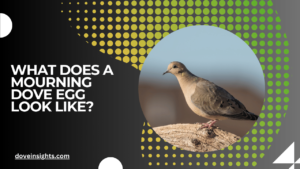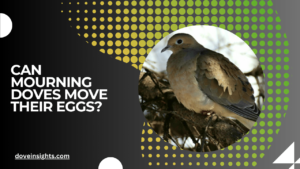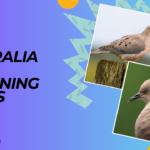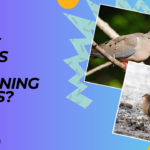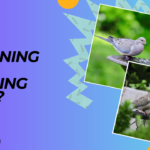Have you ever wondered what happens to a bird when its nest is destroyed? In the intricate world of avian behavior, many assume that a bird’s connection to its nest is purely functional.
After all, nests serve as the home and a safe haven for laying eggs and raising offspring. But can a bird experience something akin to mourning when its home is lost, or is it simply a matter of survival, and the bird moves on?
Birds are often seen as resilient creatures, but what happens when they face the trauma of losing their nest or young?
The act of migrating, building, and protecting a nest is a deeply ingrained behavior in birds. For many species, the nest isn’t just a structure—it’s their fortress, a place where they ensure the survival of their progeny.
This article delves into the emotional and behavioral responses of birds when faced with nest loss, examining whether mourning is possible and how it might manifest.
By understanding this complex aspect of bird behavior, we gain insights not only into avian life but also into the resilience and adaptive nature of these creatures.
In this blog post, we will explore whether birds truly mourn the loss of their nests, the emotional aspects of nest abandonment, and the various behaviors birds exhibit in response to such losses.
The emotional lives of birds are often overlooked, but understanding how they cope with adversity provides a fascinating glimpse into their world. Keep reading as we uncover the truth behind whether birds feel loss when their nests are destroyed.
Contents
- 1 The Role of Nests in Bird Behavior
- 2 Can Birds Experience Grief or Mourning?
- 3 Behavioral Responses to Nest Loss
- 4 The Effect of Environmental Factors on Nest Loss
- 5 Coping Mechanisms and Nest Rebuilding
- 6 Conclusion:
- 7 FAQ’s
- 7.0.1 Do birds experience emotions like humans?
- 7.0.2 Why do birds seem upset when their nest is destroyed?
- 7.0.3 Can birds rebuild their nests after losing them?
- 7.0.4 How do birds react to nest destruction?
- 7.0.5 Do birds return to the site of a lost nest?
- 7.0.6 Are certain bird species more affected by nest loss than others?
The Role of Nests in Bird Behavior
Nests are not just physical structures for birds; they serve as essential parts of their reproductive strategies.
For many species, the nest is where they lay eggs, protect their young, and prepare for the future. Nests provide shelter and a safe space away from predators, and their location can be crucial for survival.
Birds of different species invest varying levels of time, energy, and materials into building their nests. Some species, like robins or eagles, create elaborate nests, while others, such as sparrows, may build more modest homes.
Nesting success can directly influence the survival of their offspring. Given these significant roles, a loss or destruction of a nest could disrupt the bird’s entire breeding season, leading to stress and potential reproductive failure.
The attachment to the nest can vary between species, but for birds that form strong pair bonds or raise multiple generations within a single nest, the loss may be emotionally taxing.
Some birds exhibit behaviors that suggest a degree of grief or distress when their nests are damaged or abandoned.
Can Birds Experience Grief or Mourning?
The concept of mourning in birds is a debated topic, with little conclusive evidence to suggest that birds experience grief in the same way humans do.
However, some scientists and birdwatchers have noted behaviors that resemble mourning, such as a bird returning repeatedly to a destroyed nest or seeming to display signs of distress when separated from their young.
While birds don’t have the cognitive capacity to mourn in the way that humans or some mammals might, they can experience stress and anxiety after a significant loss. These responses can be seen as adaptive behaviors that help the bird cope with difficult situations.
For example, in species that rely heavily on their nests for protection, the loss of that home could trigger a variety of stress-induced behaviors—such as increased vocalizations, restlessness, or even changes in feeding patterns—as the bird adjusts to its new environment.
Thus, while birds may not “mourn” in the traditional sense, their emotional and behavioral reactions to nest loss suggest that they do experience a type of loss that affects their well-being.
Behavioral Responses to Nest Loss
When a bird loses its nest, the immediate response is often one of survival. Many species will attempt to rebuild or find a new location for their nest as quickly as possible.
However, some birds show a strong attachment to their original nesting site and may exhibit behaviors that suggest sadness or frustration when their nest is destroyed.
These behaviors might include lingering near the nest site, repeatedly returning to the area, or even vocalizing more often, as if searching for something.
In species like mourning doves or robins, nest abandonment or destruction can trigger a shift in reproductive behavior, with the birds either finding a new mate or attempting to nest again in a different location.
The intensity of the bird’s response to the loss varies depending on the species and the breeding strategy employed. For example, species that raise only one brood per year may exhibit more significant distress, as the loss of the nest could signal the end of that breeding season.
The Effect of Environmental Factors on Nest Loss
Environmental factors, such as predation, weather conditions, or human interference, can all contribute to the destruction of bird nests. During the nesting season, many birds face the constant threat of predators like raccoons, squirrels, or even other birds that may attack their eggs or young.
When these environmental threats destroy a nest, it often forces the birds to start over, sometimes at great energetic cost.
Urbanization and human interference also play a significant role in nest loss. In cities, birds are increasingly forced to build nests in artificial environments, such as building ledges or in trees that are too close to human activity.
If a nest is disturbed or destroyed, the birds may find it difficult to rebuild in the same area, and they may have to move to a less ideal location, which could impact their chances of successfully raising their offspring.
Coping Mechanisms and Nest Rebuilding
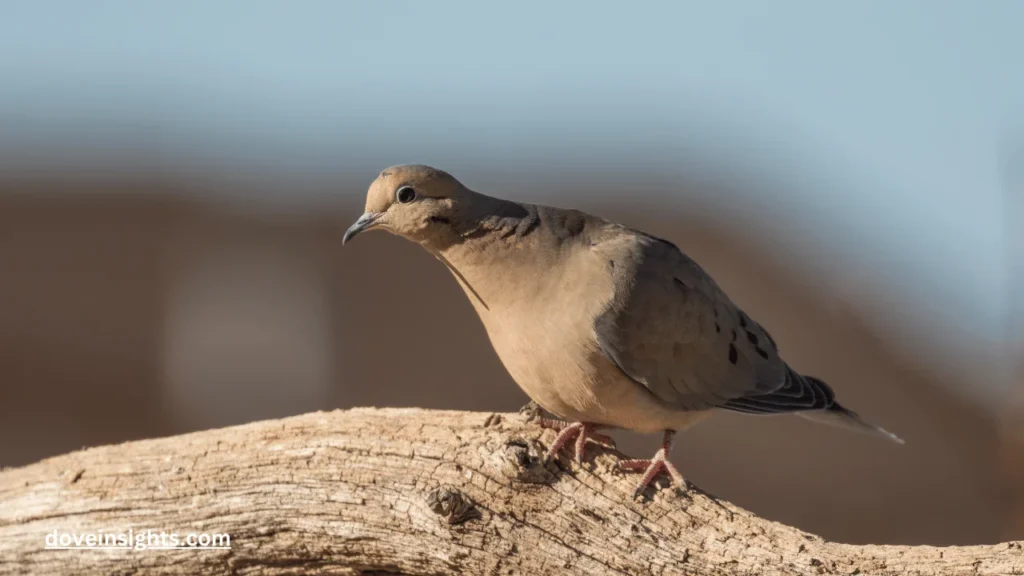
After the loss of a nest, many bird species will rebuild, sometimes in a different location or even a different type of structure. This resilience in rebuilding suggests that while birds may experience a form of distress when their nests are lost, they are also capable of adapting and finding new solutions.
Some species of birds have been observed to move their nests when the current one becomes too vulnerable, demonstrating a flexible approach to nesting.
In some cases, birds may attempt to salvage parts of the destroyed nest, reusing materials to construct a new one. This behavior points to the bird’s natural instincts to ensure the survival of its offspring.
The rebuilding process could take days or even weeks, depending on the severity of the loss and the resources available to the birds.
Conclusion:
While the emotional life of birds remains a fascinating subject, it’s clear that birds do experience distress when faced with the loss of their nests. However, whether or not this constitutes mourning in the human sense is still unclear.
Birds show signs of stress and grief-like behavior, but their reactions are more closely tied to their instincts for survival and reproduction. The loss of a nest can lead to a shift in behavior, and while it may not be “mourning” as we understand it, it is certainly a response to a significant loss.
In the end, birds’ ability to quickly adapt to new circumstances, including rebuilding their nests, highlights their resilience.
Rather than mourning the loss of their nests, birds engage in a survival mechanism that enables them to persevere and move forward in the face of adversity.
FAQ’s
Do birds experience emotions like humans?
While birds do not experience emotions in the same way humans do, studies suggest that they can feel distress and exhibit behaviors in response to loss or changes in their environment. These behaviors are often instinctual and tied to survival, rather than emotional mourning.
Why do birds seem upset when their nest is destroyed?
Birds may not mourn in a human sense, but they rely heavily on their nests for reproduction and survival. When a nest is destroyed, it can cause significant stress because it disrupts their ability to care for eggs or chicks, and it challenges their survival strategy for the season.
Can birds rebuild their nests after losing them?
Yes, many bird species are highly resourceful and will attempt to rebuild their nests if they lose them. This instinctual behavior is driven by the need to reproduce and ensure the safety of their offspring.
How do birds react to nest destruction?
Birds may react in several ways when their nests are destroyed, including becoming more vocal, agitated, or restless. They may also abandon the site in search of a safer location to start over. These reactions indicate the loss of a critical resource rather than emotional mourning.
Do birds return to the site of a lost nest?
Some birds may revisit the site of a lost nest, especially if it was a safe and successful location. However, they are often adaptable and will move to a new spot if the original site becomes unsuitable or dangerous.
Are certain bird species more affected by nest loss than others?
Yes, species that are more territorial or rely heavily on specific nesting sites may exhibit more pronounced reactions to nest loss. Birds that build nests in trees or high-altitude areas may also have more difficulty finding a new suitable spot immediately.




